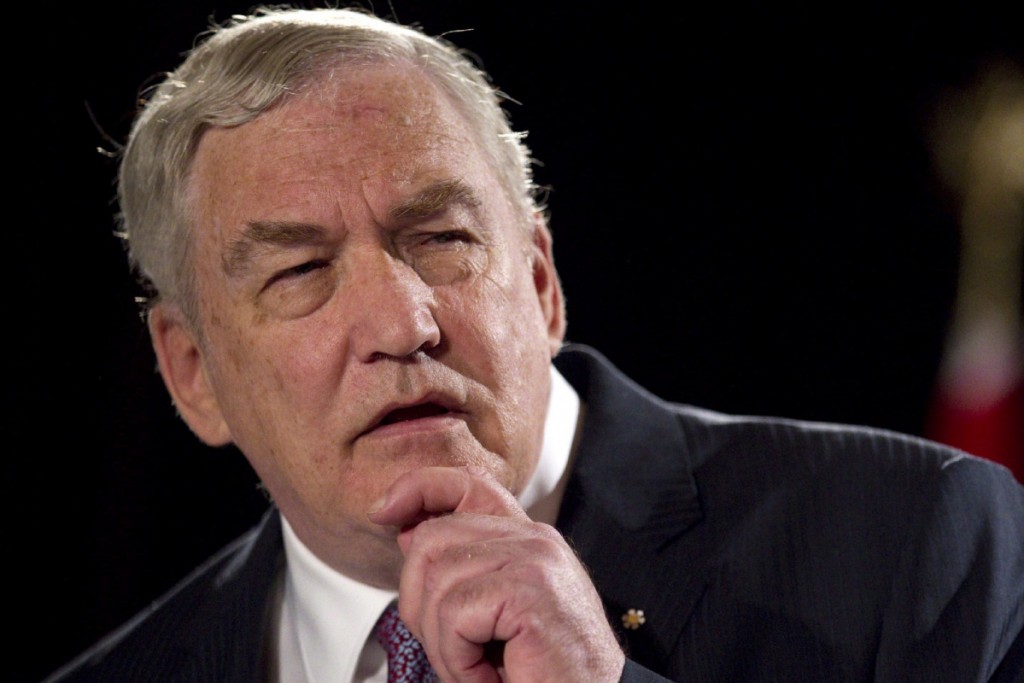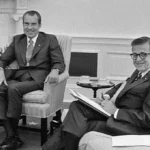Blog Post
Three Questions for Conrad Black
By Jonathon Van Maren
Two years ago, Lord Conrad Black published his first volume since his 2011 memoir A Matter of Principle, a scathing prison memoir that excoriated his foes and detailed the almost entirely-failed prosecution that landed him in an American jail. Rise to Greatness: A History of Canada from the Vikings to the Present is Conrad Black’s ode to his homeland, a sweeping history of the world’s second-largest country and a book teeming with colorful characters and skirmishes great and small.
The book was immediately assailed by a battery of snobby reviewers, who appeared to have spent weeks hunting through the pages for various microaggressions against the politically correct regime. Mr. Black, in return, responded to these complaints with a good deal of micro-caring in the National Post:
Those who have been troubled by mice or squirrels in the walls, basements or attics of their homes, would be familiar with the noise of busy little rodents that I now hear from English-Canada’s small but strivingly hyperactive literary critical commune. In my last communication with the Literary Review of Canada, I wondered if there was a slightly run-down apartment block in an out-of-the-way part of Toronto, or even Ottawa, where unaccomplished people heavy-laden with bilious opinions fester unhappily and come snorting and gibbering out of the undergrowth to snap at contrary-minded writers, for a small fee. It is a tediously familiar process, though not one without its humorous aspects.
Humorous, indeed. Lord Black was kind enough to join me on The Bridgehead for a radio interview a few weeks ago, and I had the opportunity to ask him a few questions.
JVM: Plenty of reviews ignored the bulk of your book just to focus on the very difficult things that reviews do focus on, for example examination of indigenous cultures, and you responded in the National Post quite a comprehensive rebuttal. Why do you think things like your examination of indigenous culture proved so controversial with so many of the difficult reviewers?
CB: I have the sense, and I have had the sense for a long time, that what we might call the “professional reviewers” in this country are a completely unrepresentative and esoteric group. The Canadian rule is to frequently drag out a reviewer you know to be hostile to the author because they think it is entertaining and amusing to do that. So we in our strategy for this book essentially ignored the reviewers. I didn’t speak to the Toronto Star at all. I did speak to the Globe and Mail, but we ran a big media blitz and a big book tour three times out across the country and we sold out 40,000 books at $50.00 each. Even the volume price was $35.00 for Indigo and Costco and so on. So it was a huge success in sales terms. Now I don’t do these things for money, but it has been a big success as a selling book at a relatively high price and we did this simply by ignoring the reviewers.
To finish my answer to your question, while I am reluctant to mind-read and have been to mind-read these people because I don’t know them personally, they are a nasty little group as a group. They don’t write books themselves–not that anyone would read–and so they criticise books of people who write books that others do read. They were in effect unable to attack my message, because it was an unambiguously pro-Canadian message, so the best they could do was nibble around the edges and take the odd circuitous shot at me. The only area they thought they saw any kind of open space to land a blow, was on my treatment of the Native people, and I again hear there was a certain amount of confected misunderstanding.
I am a great champion of the grievances of the Native people. Where I part company is in several areas. I do not accept that there has ever been, in a time that Canada has been an autonomous jurisdiction, anything remotely approaching any sort of a genocidal policy, cultural or otherwise. “Cultural genocide” is nonsense, by the way. There is no such thing, but that’s not the point. Even that, such as defined, was never official policy.
The twin sentiment with this has been the romanticization of the Native cultures in the matter of James Fenimore Cooper, and Chateaubriand, and contemporary writers like my friend Joseph Boyden and so forth. It’s very good literature, but it’s not history. The fact is, it was a culture that was…the Native people, as tremendously skilled as they were in certain areas, had a culture that was literally thousands of years in arrears of Europe. It was a Stone Age culture. They hadn’t invented the wheel, they hadn’t discovered metal, they had tools of bone rather than metal, they didn’t have a copper bowl or anything like it, and they didn’t have any knitted goods. They used animal skins and there were essentially nomadic. There was very little construction that lasted–a little bit out on the west coast and a bit in the Iowa Valley, that’s all. They did wonders with what they had but this idea that the emissaries of the civilization of Michelangelo and Leonardo and so forth, arrived in a society that culturally appeared to Europe as simply rubbish and that is no disrespect to the Native person. I believe in the equality of all peoples but some cultures are more advanced than others.
JVM: Why do you think that is a controversial point? Was that question so controversial because you are controversial or was it controversial because of the points you were making, which really do sound like bland historical facts when you lay them out?
CB: Again you are asking me a bit to mind-read, which I am reluctant to do as I said, but I suppose a bit of both. Where I found the reference to the Native peoples to be controversial was with the Native peoples themselves. Some of them have been more vocal. I emphasize again: They have no more vociferous advocate for address of their grievances than I am. I don’t think they have been well treated and I think we’ve got to do a much better job at trying to put things right. So don’t misunderstand the angle I am looking at this from.
I had not realized, frankly, until I saw some of the comments of Native people spokesmen, particularly in Winnipeg, which is effectively the capital of the whole First Nations movement in this country. It is a relatively large percentage of the population in that city, and they have great influence in the local media, especially the CBC out there. They attacked me in the most virulent terms, as if I was Julius Streicher, one of these propagandists from Nazi times, you know. I had not recognized, so it was an eye opener for me, the extent to which they developed this completely fraudulent blood libel on the European Canadian–that John A. Macdonald was a genocidist and Europeans were setting in to exterminate the so-called Indians and so naturally, I encountered the full hostility of that group. Frankly, that sort of hostility is something of a badge of honour…I am honoured to defend European civilization in Canada as a non-genocidal, not fundamentally evilly-intended culture. It was nothing of the kind. I may add, it does not lay on the mouths of those that are the descendants of the culture’s practically total activity, apart from the barest necessities of survival, is making war, which routinely included torturing women and children to death. It does not lay on the mouths of those people making some of the claims that they have.
JVM: We are in incredibly uncertain times and Canada is trying to find its place on the world stage. We have recently been to a number of summits, and we have foreign policy decisions that are very imminent. Where do you think Canada stands on this stage in relation to the other nations?
CB: I think it’s benignly viewed as a good country that generally speaking doesn’t do bad things. It isn’t a troubled place. It has a good alliance record when it has been tested and, in a historical view, has never participated in an unjust war and has never failed to be on the victorious side of the wars it has been in and it has contributed to them as a country that was not itself under threat. So in acts of great generosity, huge numbers of volunteers, Canadians, went to serve in both world wars and substantial numbers in the Korean War, and Canada was not under any threat there in any of those wars directly. I am not suggesting that great many people reflect on that now, but that is the background of the country and so they don’t think of Canada as they would Russia or Germany or many other great countries with vivid memories of truly terrible things that have been done in those countries.
Yet, I think it is seen as a country that is underachieving. I know Canadians cherish this view that we punch above our weight, but in my opinion we punch below our weight. We are a G7 country and we don’t have the military force of a G7 country, and since we don’t have that force we have no influence in alliances. If we had, for example, an aircraft carrier–when I was a very young man we had two aircraft carriers, and we had barely a third of the population that we have now. If we had an aircraft carrier so we could project the flag–I don’t mean to just intimidate people flying the war planes off of them, in great humanitarian disasters and things like that they are wonderfully efficient vessels. You can run them as hospital ships effectively, bringing people on board by helicopter and so on. If we projected our strength more and had more than a handful of war planes and three brigades we could then pound the table, very poetically in the Canadian manner, at NATO meetings. For example, say look here we need to do more to help these refugees, we have to do more to deter the Russians from seizing parts of the Ukraine that have no Russian ethnic component to them at all. Not that we can do it ourselves but at least we could sort of put our money where our mouths where, if you take that expression.
So I think we can do more. Incidentally, since they are not good economic times, I have said several times and what I write in the National Post, military spending is the best economic stimulant spending that there is. A lot of it goes to high tech and most of the recruitment directly reduces unemployment and it is the best form of adult education in all the advanced countries. We look at the United States, but it is the same here just the numbers are greater. All the officers are highly educated people. They have maybe come through a staff school to get there but by the time they are in the mature part of their career they are PhDs and everything, and all people that are enlisted men end up being very thoroughly qualified academically and professionally. It is just an excellent form of adult education. The Americans showed that with the GI Bill of Rights when they put 15 million people in a population of 135 million people through the university system for free after the war. That was the last great enactment of Franklin D. Roosevelt.








